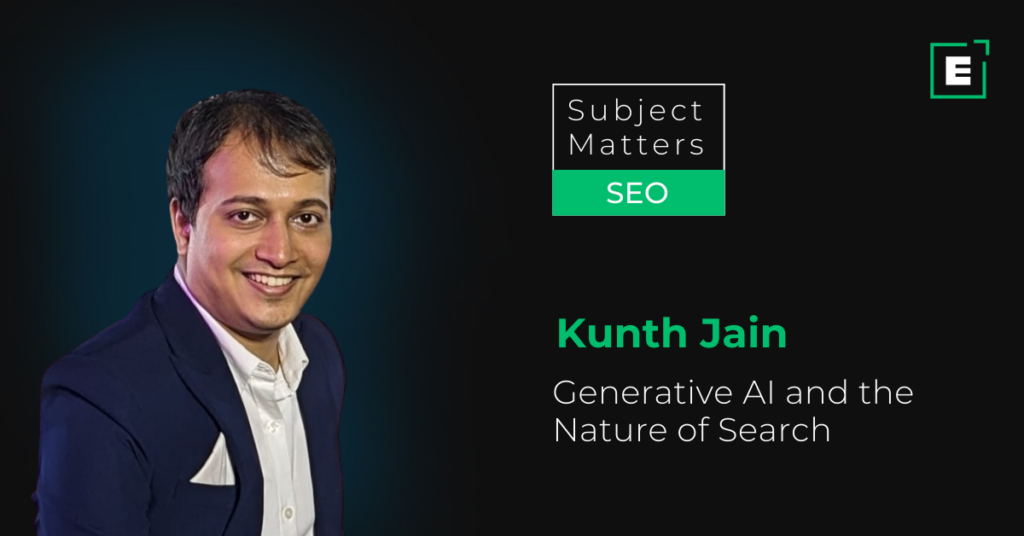Will AI Replace SEO: What Can We Guess From 10,000 Years of Human History?

The very human tendency to ‘search’ has been central to our survival. Starting from the search for basic needs like food and shelter to a better way of life led to the growth of civilization. And once our basic needs were met, humans turned their propensity to search towards more intellectual and spiritual pursuits like what the universe comprises or what is the true meaning of life. Once, we poured over books to search for what we needed until we could type all our questions into a search box on Google. And now, generative AI answers all our questions just like a friend would. While what we search for and how we do so have changed constantly, what has never changed is our essential need to keep searching. So when I, as an SEO expert, am asked, “Will AI replace SEO?” my answer looks something like this blog.
Search and the Theory of Disruption
“Things fall apart; the centre cannot hold;
–W.B. Yeats
Mere anarchy is loosed upon the world,
The blood-dimmed tide is loosed, and everywhere
The ceremony of innocence is drowned;
The best lack all conviction, while the worst
Are full of passionate intensity.”
It’s not every day that you find people in my line of work quoting poetry, but these lines from W.B. Yeats’ Second Coming capture the essence of disruption better than any definitions can. And it is disruption we must discuss first in our quest to answer the question: will AI replace SEO?
The universe hasn’t seemed favorable to the stagnant. Change has been said to be the only constant. So, it was only a matter of time before even the old disruptor (Google) got disrupted.
Jeff Bezos, the founder of Amazon, was once asked to predict the next ten years in the age of AI. And he very famously said:
“I very frequently get the question: ‘What’s going to change in the next ten years?’ And that is a very interesting question; it’s a very common one. I almost never get the question: ‘What’s not going to change in the next ten years?’
-Jeff Bezos
And I submit to you that that second question is actually the more important of the two because you can build a business strategy around the things that are stable in time.”
Search is the Only Constant
The human search for answers and meaning has been a constant. The latter is more philosophical, so let’s stick to the former for the sake of brevity.
As a corollary to understanding how transitions happen, let’s take the example of communication. The basic human need to communicate hasn’t changed since our existence. We started with sign language, then came along oral language, then writing, human messengers, letters, telegrams, the internet, emails, SMS, apps, video calls, and virtual reality (VR). Who knows what comes next?
However, if you look carefully, while the medium keeps changing, the essential need to communicate never changed. So, it’s safe to assume that for the next ten years at least, people will continue to have new questions, and thus there will be a search for answers. The need for search is not going anywhere.
But does this mean the answer to “Will AI replace SEO” is a resounding ‘no’?
We can’t commit to that yet because there’s another challenge.
AI and the Moral Dilemma of Truth vs. Opinion
Take a close look at your hand. What is the color of your fingers? Would you call what’s usually called ‘skin color’?
There is an inherent complexity here. Based on the traditional Euro-centric education most of us got, what’s defined as ‘skin color’ was inherently closer to their own culture. Some might argue that those were the old ways of seeing things. We have moved past, and there is no one ‘skin color’; we all have different skin colors.
But then there are scientists who would say that the very concept of color is based on our biased reading of light wavelengths. There is nothing like color in the universe. Consequently, the question itself isn’t valid.
In the age of AI and genomics, you might even be able to change the color of what’s supposedly your skin. Fascinating, yet scary. Right?
That’s the primary struggle that the scientists and business leaders at Google constantly grappled with prior to the launch of ChatGPT, which changed how to answer human questions.
The reason that Google didn’t launch AI-based answers was that they didn’t believe most human questions could have just one correct answer. They certainly had the capability but didn’t believe they should be the arbitrator of the truth.
Thus, they continued with search results. Building their business on the marketplace of opinions instead of the quest for truth.
Google allowed us to grapple with the uncertainties of finding the right answer from the different search results it ranked based on the E-A-T (Expertise, Authoritativeness, Trustworthiness) framework. Mostly, they didn’t claim to provide one answer (except in the somewhat dicey case of Search Snippets). They were happy just indexing and organizing the internet.
The Age of Convenience Leading to AI
But their near monopoly was a constant center of attention. Google had taken a relatively guarded approach despite being the corporate pioneer of AI. OpenAI didn’t bother itself with foolproofing the bias and security prior to launch. And this is what led to 1000+ top AI voices asking to halt/rethink the public launch of AI.
‘Maximizing convenience’ could be the defining phrase for most of what’s happened in the last 30 years. All of our digital and soon virtual reality worlds have been advancing in the name of providing us convenience.
Why do I need to learn history and dates? One can always find them in a book. The same argument is being used today by students everywhere. Information seems to have become convenient.
– Albert Einstein
While Amazon made shopping convenient, Uber made travel convenient; AI platforms are attempting to make ‘knowledge’ (and, in some cases, the truth) convenient.
However, there is a difference between information and knowledge. Social media echo chambers have made many more people believe that the holocaust never happened. That climate change isn’t happening, and more. And yes, the scale at which Facebook operates it’s largely left to their AI about what to show and to whom.
This would be the most likely future of search as well. While Google has kept a lot of guardrails to prevent misinformation or discriminating results, there have been several instances of people seeing biased results, even based on something you ordinarily wouldn’t imagine- the color of their skin.
The Market Verdict: Monetizing the AI Search Model
Everybody loves a revolution, but who is going to fund it?
Our current economic model, of which Google has been a major beneficiary for more than 25 years, seems to have finally flipped after the launch of ChatGPT and other AI tools. And because of a loss aversion tendency, the search giant let go of several ethical dilemmas and made decisions that kept the SEO model (and thereby their advertising business model) intact.
We are again at a time in history where an existing giant like Google (think Kodak, Blackberry, Sony Walkman at their peak) is at the cusp of being disrupted by a newbie. However, the tech behind AI models, as revolutionary as it is, hasn’t yet found a viable business model. This was well captured in a Google researcher’s statement, “We have no MOAT, and neither does OpenAI”.
And that’s the big challenge. No revolutionary or even magical technology can survive for long in the absence of a business model.
While whistling to a song, despite having no monetary gains, continues to be a common pastime, the people and corporations developing AI models aren’t building them without an eye on revenue and profits.
So, Will AI replace SEO in the Future?
If I remember correctly, in the movie Lincoln (2012), the protagonist says, “I have found that predicting the future, as engaging as it is, isn’t a profitable venture.”
I tried searching the same on Google and ChatGPT but didn’t find the exact quote. The above is just an anecdote, but it shows that neither AI seems to have reached perfection, nor does the very human search for answers come to an end.
For all the advances AI tech seems to have made, there’s still a large market for opinions and answers that can’t be contained within a 1000-word limit. Until we find a better business model for delivering those answers, I guess SEO will have a place in the digital world.
There is definitely a downfall in how many clicks you can get from search engines because of ever-declining CTRs. SEO as a channel might still be a good source of high-intent audiences for the next five years.
After all, despite the plethora of websites, apps, and AI predictions, one prevalent way to get a sense of whether it will rain or not today is still to look outside the window.
NOTE: The views expressed in this article are those of the author and not of Emeritus.






